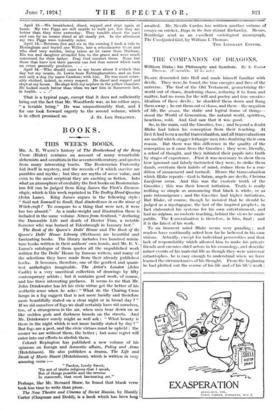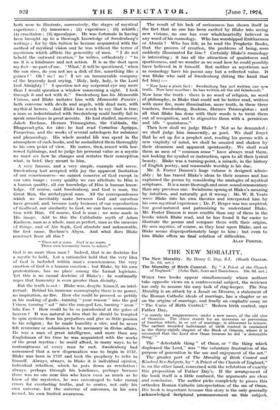THE COMPANION OF DRAGONS.
BLAKE descended into Hell and made himself familiar with devils. They were, he found, the true energies and fires of the universe. The God of the Old Testament, geometrizing the world out of chaos, deadening chaos, reducing it to form and matter, had no room for the will and poetry and true creative idealism of these devils ; he shackled them down and flung them away ; he cut them out of chaos, and there—the negation of life, the Kepwa; the static and logical frame of things stood the World of Generation, the natural world, spiritless, heartless, cold. And God saw that it was good.
So, in the main, said the Gnostics, too ; and beyond a doubt Blake had taken his conception from their teaching. At first it had been a useful transvaluation, and all transvaluations are useful which stagger lethargic men into doubting their own reason. But there was this difference in the quality of the conception as it came from the Gnostics ; they were, literally, a school of thought, and they initiated their pupils into truth by stages of experience. . First it was necessary to show them how ignorant and falsely-instructed they were, to strike them dumb, overturn their habits of mind, reduce them to a con- dition of amazement and turmoil. Hence the transvaluation which Blake repeats—God is Satan, angels are devils, Christus Luciferus verus. And this was the exoteric truth of the Gnostics ; this was their lowest initiation. Truth is really nothing so simple as announcing that black is white, or as pure intransigence ; and the Gnostics had higher initiations. But Blake, of course, though he insisted that he should be judged as a mystagogue, the last of the inspired prophets, in fact elaborated his systems for his own entertainment, and had no adytum, no esoteric teaching, behind the views he made public. The transvaluation is therefore, in him, final ; and it is the latest of his work.
To an innocent mind Blake seems very puzzling ; and readers have continually asked how far he believed in his own visions. Actually, except for individual perversities and that lack of responsibility which allowed him to make his private friends and enemies chief actors in his cosmology, and describe minor events of his material life as though they were universal catastrophes, he is easy enough to understand when we have learned the circumstances of his thought. From the beginning he had plotted out the course of his life and of his life's work ;
both were to illustrate, successively, the stages of mystical experience : (1) innocence ; (2) experience ; (3) rebirth ; (4) crucifixion ; (5) apocalypse. He was fortunate in having been brought up to a thorough knowledge of Swedenborg's writings ; for by this tuition he became acquainted with the method of mystical vision and he was without the terror of mysticism which afflicts the generality of men. " I do not behold the outward creation," he writes, orthodoxly " to me it is a hindrance and not action. It is as the dust upon my feet—no part of me. ' What,' it will be questioned, when the sun rises, do you not see a disk of fire, something like a guinea ? ' Oh ! no ! no ! I see an innumerable company of the heavenly host crying, ' Holy, holy, holy, is the Lord God Almighty ' I question not my corporeal eye any more than I would question a window concerning a sight. I look through it and not with it." Swedenborg has his Memorable Visions, and Blake imitates him with Memorable Fancies ; both converse with devils and angels, with dead men, with mythic al heroes. And Blake has much to say that is true; a man so indoctrinated with Swedenborg could hardly fail to speak sometimes in great accents. He had studied, moreover, Jakob Boehme, Hermes Trismegistus, the Cabbala, the Bhagavad-gita, for idea: he had read Cornelius Agrippa, Paracelsus, and the works of several astrologers for substance and phraseology. His whole mental life was spent in the atmosphere of such books, and he assimilated them thoroughly to his own point of view. He comes, then, armed with bor- rowed lightnings, and to judge his personal value as a mystic we must see how he changes and restates their conception what, in brief, they meant to him.
A very famous, and a very simple, example will serve. Swedenborg had accepted with joy the apparent limitation of our consciousness—we cannot conceive of God except in our own image ; every quality we can attribute to Him is a human quality, all our knowledge of Him is human know- ledge. Of course, said Swedenborg, and God is 'man, the Great Man, the archetypical man. All the correspondences .which we inevitably make between God and ourselves have ground, and, because (only because) of our reproduction of Godhead, our similarity to God, we can have communica- tion with Him. Of course, God is man ; we were made in His image. Add to this the Cabbalistic myth of Adam Kadmon, man as a whole, man as perfect, man as the measure of things. and of AM Soph, God absolute and unknowable, the first cause, Boehme's Abyss. And what does Blake construct from all this ?
" Thou art a man. God is no more.
Thine own humanity learn to adore."
God is no more than man ? Indeed, that is no doctrine for a mystic to hold, Let a rationalist hold that the very idea of God is included within man's consciousness, the very emotion of God is a human emotion ; but Blake, by his own protestations, has no place among the formal logicians. Yet this is no casual doctrine of Blake's : he continually urges that humanity is even greater than divinity.
But the truth is mat : Blake was, despite himself, an intel- lectual. Behind his immense cosmography there is no power, no inspiration, no fire. How else could he proceed so pettily in his making of gods—turning " your reason " into the god Urizen, turning " sol " into the sun-god Los, turning " aeon " into Eno ? How could he be so paradoxical at the gates of heaven ? It was natural in him that he should be tempted to spin systems from his prejudices and give so little passion to his religion ; for he made humility a vice, and he never :felt reverence or submission to be necessary in divine affairs. He was a man of great intelligence, and more than any .Englishman of his time he was acquainted with the works of the great mystics : he could afford, in many ways, to be contemptuous of every man he met. Swedenborg had announced that a new dispensation was to begin in 1757. Blake was born in 1757 and took the prophecy to refer to himself. Always, always, in Blake it is individual opinion, individual rebellion, which he puts down as revelation : always, perhaps through his loneliness, perhaps because there was no one near him who knew even as much as he knew of the mysteries, he was encouraged to take casual errors for everlasting truths, and to centre, not only his own universe, but the universe of universes, in his own monad. his own limited awareness.
The result of his lack of seriousness has shown itself in the fact that no one has been excited by Blake into seeing new visions, no one has ever wholeheartedly believed in any word of his cosmology. Who has worshipped Enitharmon or Ahania ? Who has felt, as lie read the Prophetic Books, that the process of creation, the problems of being, were suddenly illuminated for him ? Certainly Blake's cosmology is interesting ; it has all the attraction of quaintness and sportiveness, and we wonder as we read how he could possibly have believed in it himself. But neither as mysticism nor as cosmology have his poems any but a reflected value. It was Blake who said of Swedenborg (biting the hand that fed him) :—
" Now hear a plain fact : Swedenborg has not written one new truth. Now hear another : ha has written all the old falsehoods." Now hear the truth : there is no word of religion, no word of philosophy, in Blake that could not be'better read, written with more fire, more illumination, more truth, in these three teachers, Swedenborg, Boehme, :Hermes Trismegistus ; and all that Blake has done with their .words is to twist them out of recognition, and to stigmatize them with a pernicious and idle " quaintness."
Then how shall we judge Blake ? Not as he demanded ; we shall judge him innocently, as poet. We shall forget that he set up for a prophet and, reading his poems with a new virginity of mind, we shall be amazed and shaken by their cleanness and apparent spontaneity. We shall read them as men of " common sense " have always read them, not looking for symbol or instruction, open to all their lyrical beauty. Blake was a turning-point, a miracle, in the history of English poetry, and reasonable worship is his due.
Mr. S. Foster Damon's huge volume is designed admir- ably ; he has traced Blake's ideas to their sources and has explained the poems by considering the analogies of mystical scriptures. It is a more thorough and more sound commentary than any previous one. Swinburne sprang at Blake's meaning by intuition, and naturally got it wrong ; Mr. W. B. Yeats wove Blake into his own theories and interpreted him by his own mystical experience ; Dr. P. Berger was too sceptical, too good-natured and patronizing to understand Blake. Mr. Foster Damon is more erudite than any of them in the books which Blake read, and he has found it far easier to illustrate the poems and compare them with their origins. He sees mystics, of course, as they bear upon Blake, and so Blake seems disproportionately large to him ; but even to him Blake offers no final solution of difficulties.
ALAN PORTER.











































 Previous page
Previous page